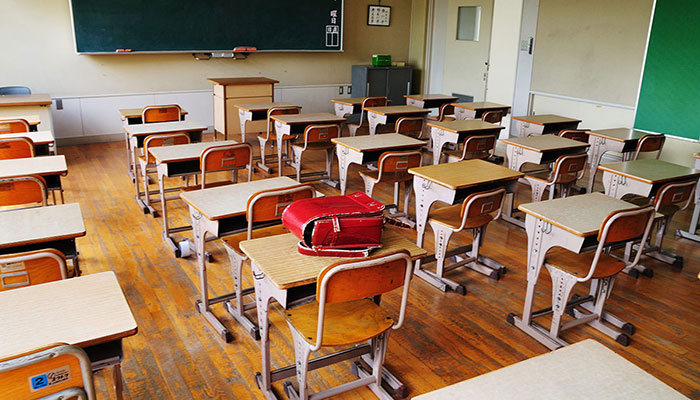Not a single school desk bought in eight years, SHC told
The provincial education & literacy department has remained unsuccessful in procuring desks for public schools during the past eight years, and according to a survey of the department’s Reform Support Unit, 1.6 million desks are currently required, the special secretary education informed the Sindh High Court (SHC) on Wednesday.
During the hearing of a lawsuit pertaining to the procurement of furniture for public schools of the province, the special secretary said that every year Rs6.6 billion is allocated for the purpose, and that the present case pertains to the purchase of 250,000 desks. He said the procurement was delayed due to the court’s interim stay order since 2019.
The secretary procurement committee said the issue is very serious because majority of the functional schools lack desks. He said normally a double desk sits two, and over Rs42 billion is required to resolve the issue.
He also said even if the budget is increased, proper resolution of the issue will take three years. He added that the education department will procure a lot more than 150,000 desks by inviting tenders within two days.
After hearing the statements of the officials, the single SHC bench of Justice Salahuddin Panhwar said if it is believed that a desk is meant for two, it makes it clear that 1.6 million students are forced to study sitting on the ground, which hurts the children’s dignity, even though it is a matter of record that there are many stakeholders in education that provide funds, including donors agencies.
The special secretary education said they have placed their concerns before the chief minister with regard to increasing the budget. The court directed the chief secretary, the schools secretary and the finance secretary to take special measures and submit a plan assuring that the issue stands redressed.
The court said it is expected that the government will provide desks to all schools within two years by increasing the fund allocation under the relevant head in the upcoming budget. The court also said it is needless to add that the quarters concerned will not turn a blind eye to their obligation of providing proper classrooms to students only in the name of the excuse of increasing the budget.
The counsel of the plaintiff said his client had also issued letters to the quarters concerned, including the procurement secretary, to resolve the issue amicably. The education department official said they will convene a meeting after receiving the letter, and examine the plea to resolve the matter and complete the procedure positively within the current financial year so that this year’s budget allocation does not lapse.
The court said the procurement secretary is expected to do more than just convening a meeting, like assuring that preferences are set within the available budget and the utilisation thereof is ensured per such preferences.
The bench directed him to set such preferences and submit them to the court. The bench continued the interim order until April 21, saying about the process relating to the remaining funds on the same subject, the education department may carry out that process in accordance with the law without any hurdle.
-
 Pamela Anderson, David Hasselhoff's Return To Reimagined Version Of 'Baywatch' Confirmed By Star
Pamela Anderson, David Hasselhoff's Return To Reimagined Version Of 'Baywatch' Confirmed By Star -
 Willie Colón, Salsa Legend, Dies At 75
Willie Colón, Salsa Legend, Dies At 75 -
 Prince Edward Praised After Andrew's Arrest: 'Scandal-free Brother'
Prince Edward Praised After Andrew's Arrest: 'Scandal-free Brother' -
 Shawn Levy Recalls Learning Key Comedy Tactic In 'The Pink Panther'
Shawn Levy Recalls Learning Key Comedy Tactic In 'The Pink Panther' -
 King Charles Fears More Trouble As Monarchy Faces Growing Pressure
King Charles Fears More Trouble As Monarchy Faces Growing Pressure -
 Inside Channing Tatum's Red Carpet Return After Shoulder Surgery
Inside Channing Tatum's Red Carpet Return After Shoulder Surgery -
 Ryan Coogler Brands 'When Harry Met Sally' His Most Favourite Rom Com While Discussing Love For Verstality
Ryan Coogler Brands 'When Harry Met Sally' His Most Favourite Rom Com While Discussing Love For Verstality -
 Sarah Pidgeon Explains Key To Portraying Carolyn Bessette Kennedy
Sarah Pidgeon Explains Key To Portraying Carolyn Bessette Kennedy -
 Justin Bieber Rocked The World With Bold Move 15 Years Ago
Justin Bieber Rocked The World With Bold Move 15 Years Ago -
 Sam Levinson Wins Hearts With Huge Donation To Eric Dane GoFundMe
Sam Levinson Wins Hearts With Huge Donation To Eric Dane GoFundMe -
 Kate Middleton Steps Out First Time Since Andrew Mountbatten-Windsor's Arrest
Kate Middleton Steps Out First Time Since Andrew Mountbatten-Windsor's Arrest -
 Inside Nicole 'Snooki' Polizzi's 'private' Marriage With Husband Jionni LaValle Amid Health Scare
Inside Nicole 'Snooki' Polizzi's 'private' Marriage With Husband Jionni LaValle Amid Health Scare -
 Germany’s Ruling Coalition Backs Social Media Ban For Children Under 14
Germany’s Ruling Coalition Backs Social Media Ban For Children Under 14 -
 Meghan Markle Shuts Down Harry’s Hopes Of Reconnecting With ‘disgraced’ Uncle
Meghan Markle Shuts Down Harry’s Hopes Of Reconnecting With ‘disgraced’ Uncle -
 Liza Minnelli Alleges She Was Ordered To Use Wheelchair At 2022 Academy Awards
Liza Minnelli Alleges She Was Ordered To Use Wheelchair At 2022 Academy Awards -
 Quinton Aaron Reveals Why He Does Not Want To Speak To Wife Margarita Ever Again
Quinton Aaron Reveals Why He Does Not Want To Speak To Wife Margarita Ever Again




